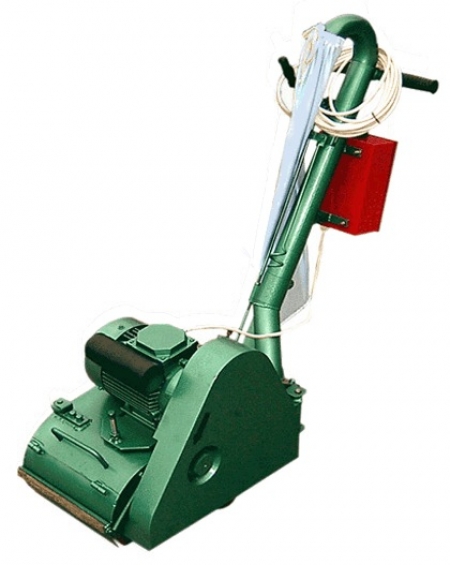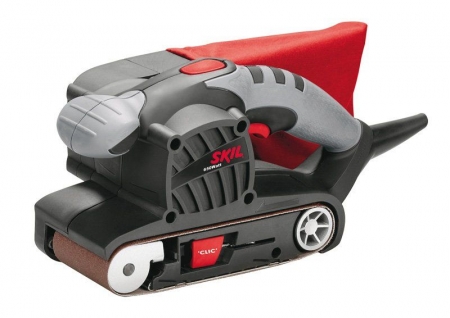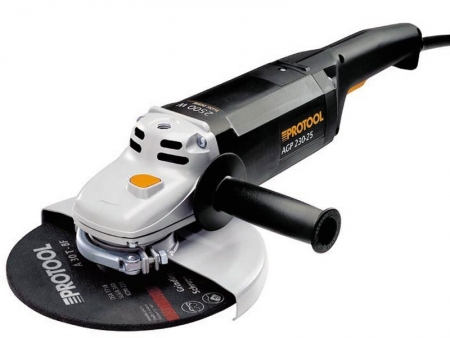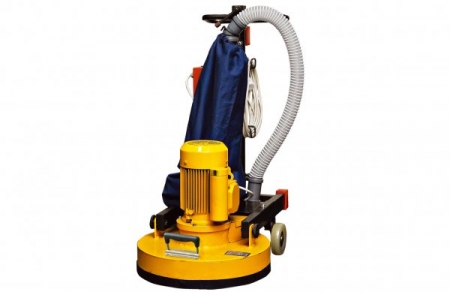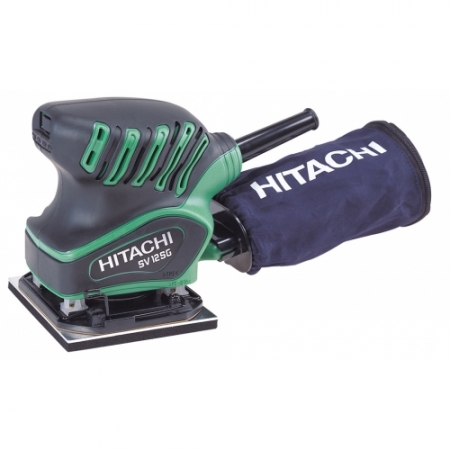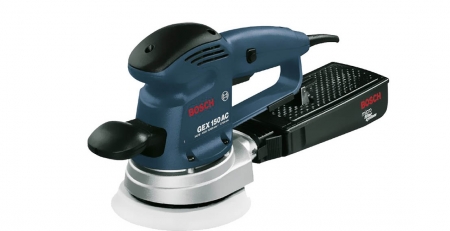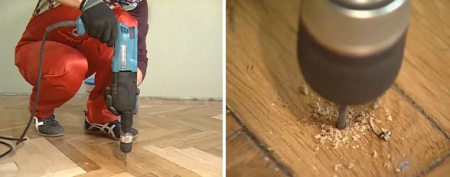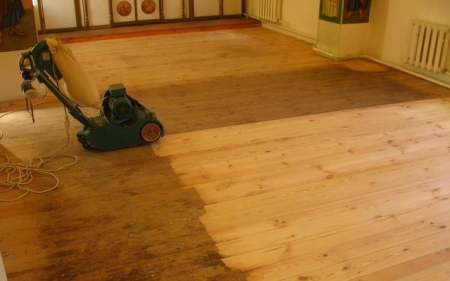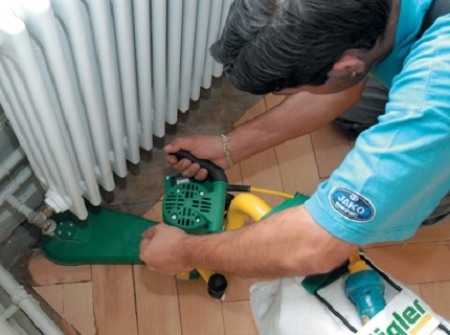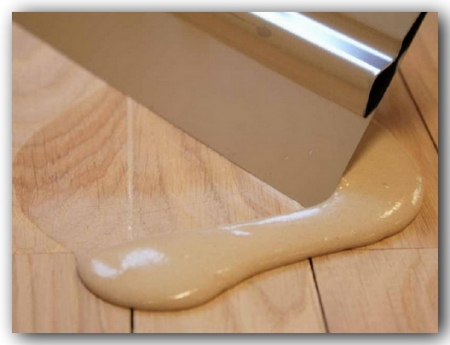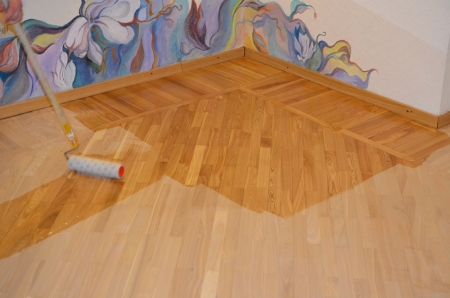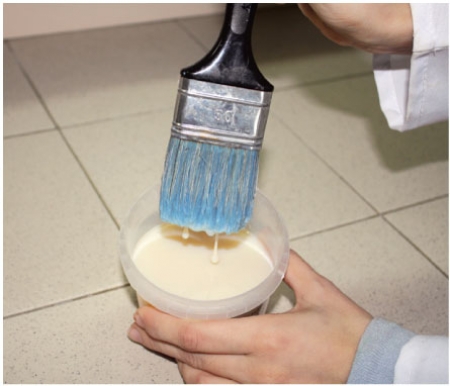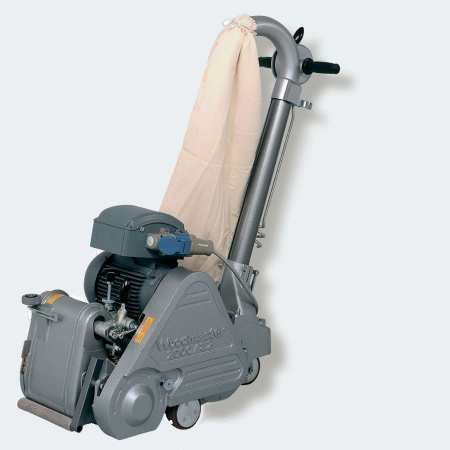To date silicone sealant for the bathroom appears before ...
|
|
The construction of the basement in the house is the task that every owner faces ... |
A wooden house always fascinates with beauty and attractiveness. But in order to ... |
Grinding parquet. How to polish the parquet with your own hands?
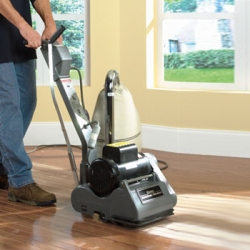
Directly laying parquet is just the first step to get a beautiful flooring. To achieve the necessary result, you will need to carry out a number of works, such as leveling the surface, grinding and applying varnish. All the same measures are made in the case of restoration of the old parquet.
Content:
- What is the difference between grinding the parquet and a cycle
- Equipment for grinding parquet
- How to polish your own parquet
- How to choose a parquet varnish
- Grinding parquet without dust
What is the difference between grinding the parquet and a cycle
To date, manufacturers are presented with a large selection of modern high -quality tools. But before proceeding with the review of the most popular equipment, you should clarify how, the grinding of the cycle differs.
Cycles mean manual grinding of the parquet cycles. With the help of this device, chips are removed.

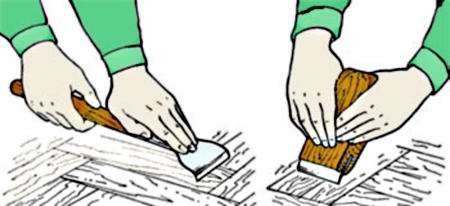
Grinding is carried out by special parquet-grinding machines. Depending on the settings and nozzles, they are polished with different depths and with different smooth surface.

But even among professional builders, the first stage of the parquet processing is usually called a cyclist, and all subsequent are grinded. But there are no special cycling machines, just some models of grinding machines can perform primary processing.
Parquet grinding technology:
- The first stage is the primary cycle. Grinding or ribbon -type grinding machines are grossly cyclime of the surface of the parquet.
- The second stage is grinding. Ribbon grinding machines with smaller abrasives are used. For hard -to -reach places, angular grinding machines are used.
- The third stage is finished grinding. With the help of flat grinding machines, three -disc or single -disk, the parquet is given a perfectly flat surface.
- The fourth stage. Application of varnish and protective gel.
Equipment for grinding parquet
Poving machines for drum -type parquet
This is the most common and universal tool. They are carried out cycles and grinding. The machine has a simple and reliable design. It is produced with two types of grinding drums - centrifugal and roller. It works with consumable abrasive materials of all manufacturers. Using a drum type grinding, surface treatment is performed taking into account the fibrous structure of wooden parquet and can be performed in three directions.
Parquet tape grinding machines
They are used for grinding and cycling of large areas, as well as for working with rough surfaces. The design of the machine is provided in such a way that the center of gravity is located low, which creates a dense fit to the processed surface. In turn, this makes work with her easier, because it is not required to make additional efforts. They are of different capacities, but the higher it is, the more work can be performed non -stop.
To increase the specifics of tasks, ribbon grinders are equipped with abrasive tape speed regulators. It is easily removed independently, and the new one is installed no less reliably. Depending on the functions of the abrasive tape (for cycling or for grinding), it has different width and granularity. In some more expensive models, automatic centering of the tape is already provided.
Corner grinding machines
They are designed to process hard -to -reach places. The working element in the grinder is a grinding disk, which is flat, plastic, cup, polishing, etc. Modern models are equipped with many useful options: maintaining a constant number of revolutions, adjusting the revolutions sewn from unintentional inclusion, and a soft launch.
The most popular manufacturers of the power tool, whose quality has remained at a high level for many years: Makita, Bosch, Black & Decker, Sparky, Metabo, Atlas Copco.
Disco for grinding parquet
Most often, planning grinding machines are used during finish grinding parquet. Three -disc and single -disk are treated the surface before tinting and to cover the parquet with varnish.
They are produced in different sizes and with a large range of nozzles. This is necessary for maximum maneuverability in hard -to -reach parts near pipes, under batteries, etc. They are a good alternative to corner grinders.
The most popular brands of disk machines: Janser, Lagler, Bosch, Clarke, Atlas Sorsso.
Vibration grinding machines
They belong to the type of flat -grinding. But thanks to their versatility, they can be used not only for finishing grinding, but also for gross primary processing. They work on the principle of reciprocating progressive movements. The larger the amplitude of the oscillations of the rectangular sole, the higher the speed of work. But the higher the speed, the lower the quality, therefore, for the finish, a low amplitude of movement is selected.
As consumables, rectangular abrasive sheets of different granularity, spraying and grinding tissues are used.
Eccentric grinding machines
They combine the principle of operation of a grinding circle and a vibrational machine. As a result, a high -performance tool is created. Thanks to the combination of movement and vibration, excellent quality processing is obtained.
Productivity is regulated by the diameter of the vibration circle. But, the less it is, the higher the quality of processing, and vice versa. The choice of speed is also important, a higher purpose for rough grinding. When working with parquet, you need to choose a small speed. The varnish with which it is covered is very sensitive to high temperature and friction.
The leading positions among manufacturers of eccentric and vibrational machines are occupied by companies such as Bosch, Dewalt, Black & Decker, Metabo, Stomer.
Many grinding machines have a bag for collecting dust, which can significantly reduce the amount of dust during operation, but do not exclude its appearance completely.
The most popular cars were described above. But this is not all that the parquet is polished. In addition to them, there are several more species: deltashal, direct grinding, pneumatic grinder, etc. They are universal and are used not only for wood processing, but also when working with concrete or metal surfaces.
How to polish your own parquet
DIY parquet grinding is carried out in several stages. Consider each of them in more detail.
Preparation of parquet for grinding
Before starting work, all furniture is carried out of the premises. Now you can carefully consider the parquet coating completely, identifying all the shortcomings. For a quality result, it is necessary to tighten each bar of the parquet. If the sound turned out to be deaf, then it has peeled off, and a void formed under it. It is easy to fix this, it is enough to drill a thin hole in it, roll glue for parquet through the construction syringe, press on top with a load and let it dry.
The surface needs to be thoroughly washed, remove all the screws, nails. Otherwise, you can quickly damage the abrasive skin.
Tools and material for grinding parquet
DIY parquet polishing a parquet will need:
- parquet-grinding machine with the possibility of cycling. The tool is expensive, but available if you rent it. They are treated with the main area of \u200b\u200bthe parquet;
- manual strip or angular grinder for processing hard -to -reach places;
- manual cycle. It is useful for cycling of the parquet in very difficult places for access;
- several ribbons of sandpaper. The smaller the number, the larger the granularity of the skin. To work with the parquet, No. 120,80,60,40 will be required;
- wood putty, to cover the cracks in the parquet;
- high -quality parquet varnish;
- drive for cleaning and a small improvised tool (screwdriver, scissors, rags, etc.)
Having prepared the room, material and tools, you can proceed directly to the grinding of the parquet.
Parquet cycles
For the cycle, a tape type grinding is required with an abrasive skin No. 40. Using this machine, the main area of \u200b\u200bthe parquet with an indent from the wall is processed about 10 cm. Along the walls, hand -ribbon or disk grinding machines for parquet are used.
Tip: you can not use manual grinders to process the entire area of \u200b\u200bthe floor. This will lead to the formation of pits and other irregularities.
The purpose of this stage of work to remove the old varnish coating and level the surface of the parquet. Grinding is carried out first along the room, and then across. It is especially important to carefully monitor the condition of the abrasive skin. The very worn out she will burn the parquet, leaving dark spots on it. To check the fed floor, a three -meter rule is used. Unevenness under it should not exceed 2 mm.
After a rough cycle on the floor, scratches and zabins always remain, which is the norm. They are removed with the following grinders with skins No. 60, and then No. 80. Work is also carried out along and across. The exception is when the parquet is laid in parallel to the walls. In this case, it is polished only along the laying line. And when laying a Christmas tree diagonally. At this stage of uneven parquet should not exceed 1 mm.
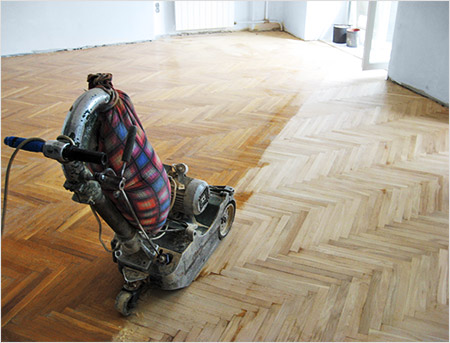
Putty parquet
When the parquet is polished by the skin No. 80, it is putty. The putty for these works is selected by texture and color similar to wood. Often use water -based acrylic putty or mixed sawdust remaining during cycling, with parquet varnish. With the help of a metal spatula, the cracks between the strips are filled with the mixture.
The finish grinding parquet
After the putty hardens, the parquet is polished by the finish abrasive skin No. 120. It will be necessary to weaken the pressure of the grinder on the floor using a special adjusting screw, which equip all modern models.
The direction of grinding is exactly the same as at the previous stages of work. As a result, the parquet should be perfectly smooth, which is quite easy to check by running a hand on it. Now it is important to very carefully remove all the dust with a powerful vacuum cleaner.
On average, all these processes of grinding parquet take about 6 hours.
Lackery of polished parquet
Before starting varnishing, all windows are closed in the room to avoid the occurrence of drafts. The optimum temperature for work is 22-24 degrees.
Parquet is varnished in several stages:
- a primer is applied as the first layer;
- then, three layers of varnish are applied alternately. Between each layer is grinded with a diamond grid R-220;
- as a finish coating, a glossy gel is used to fix the varnish.
About how to polish the parquet correctly, in more detail, is shown in the video.
How to choose a parquet varnish
Parquet varnishes are divided by the degree of shine and wear resistance.
Matter depends on the amount of passive aggregate in the varnish. Changing the proportions, they make glossy, semi -water and matte varnishes. But this filler settles at the bottom, so before applying the varnish is thoroughly mixed.
The wear resistance of the varnish is selected based on the functionality of the room in which the parquet is laid. Lucky with low or medium stability are suitable for the house, for more crowded places they are selected with increased abrasion resistance.
Types of varnishes:
- Polyurethane varnishes. They are made on the basis of solvents, acrylic or uretana. Their pluses include high elasticity, heat resistance, good adhesive qualities and ultraviolet resistance. They cope with a high load, are not afraid of household chemicals and high humidity. The disadvantage is that polyurethane varnish glues the bar. And when moisture gets during varnishing, it begins to foam.
- Water -soluble varnishes. This is a pretty new product. He hardens after the evaporation of water, forming a film. They practically do not distinguish harmful chemicals, and are not inferior in strength to other types of varnishes. Suitable only for rooms with constant plus temperature. The most wear-resistant is acrylic and polyurethane varnish, and acrylic varnish will need to be periodically updated.
- Oil resin -based varnishes. These are urethic and alkyd varnishes made of linseed or wood oil, which allows them to close deep into wood. They do not glue the planes of parquet, and the coating turns out nonsense. But they are toxic and dry for a long time.
- Acidly adverse varnishes. They are made on the basis of directly varnish and hardener. It has the highest wear -resistant qualities, undemanding to temperature and humidity. The disadvantages are a strong smell and strong gluing of the planks.
Grinding parquet without dust
The only option to update the old parquet is to make a cycle, cover the cracks, polish and varnish. But many owners of parquet floors are in no hurry to return his former beauty. And to blame the prospect of dusty and noisy work. Indeed, the wood dust, which is formed when removing the old coating, penetrates everywhere and eats into furniture and curtains.
But you can do all these works without dust. Most modern models of parquet-grinding machines are equipped with vacuumers. If you add to this and absence in the premises of drafts, then the dust will practically not fly away. For additional protection, a static film is used, which covers the walls of the room in which work is carried out.
Grinding with powerful vacuumers, on which high -quality filters are installed, are very expensive and accessible only to professional builders. If there is confidence in your abilities, then you can contact one of the companies and take the tool for rent. It is especially important to use such machines for processing parquet from valuable wood - wenge or nut. This is due to the fact that the dust of these wood species has coloring elements. Therefore, when settling it on furniture or wall, it can paint them, but it will be almost impossible to clean them.
Of course, the grinder will not be able to completely collect dust during operation, but still most of it settles in vacuumers. So, they are great for the restoration of the old parquet in already finished rooms.

